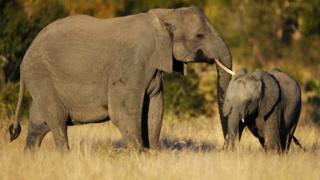Navigation
Install the app
How to install the app on iOS
Follow along with the video below to see how to install our site as a web app on your home screen.

Note: This feature currently requires accessing the site using the built-in Safari browser.
More options
You are using an out of date browser. It may not display this or other websites correctly.
You should upgrade or use an alternative browser.
You should upgrade or use an alternative browser.
Elephant Rolls Car
- Thread starter Tank
- Start date
Elephant poaching stablizing and may go down...

Elephant killings in Africa 'stabilise' but threat continues
Thu, 28 Jul 2016 - The rapid growth in the illegal killing of African elephants seen since 2006 seems to have stabilised and may be decreasing.

Elephant killings in Africa 'stabilise' but threat continues
Thu, 28 Jul 2016 - The rapid growth in the illegal killing of African elephants seen since 2006 seems to have stabilised and may be decreasing.
Two new reports indicate that across the continent, the numbers of elephants being killed for ivory has slowed. But the picture is mixed as the slaughter in Central and West Africa shows no sign of moderating. Some experts believe that the decline in deaths could be down to fewer elephants being alive to poach.
Numbers high, trend down
The BBC investigated the war on elephants earlier this year and how it is fuelled by demand for ivory from Asia. Now there is new data on the sources of the illegal killings from the Convention on the International Trade in Endangered Species of Wild Fauna and Flora, better known as Cites. They run two important elephant monitoring records that are seen as reliable indicators of what's happening on the ground. A few months ago, the Mike programme (Monitoring the Illegal Killing of Elephants) showed that number of deaths, which started to grow in 2006, peaked in 2011. Even though the trend is moving in the right direction, there were still over 14,000 elephants killed in the period from 2003-2015.

The BBC also investigated the war on elephants this year and how it is fuelled by demand for ivory from Asia. New data has also been published for the ETIS programme (Elephant Trade Information System). This shows that while trading in illegal ivory reached its highest levels in 2012 and 2013, it had levelled off by 2014. But while there are some positives in the overall picture for Africa, the regional differences are stark. Southern Africa is the area where poaching levels have remained consistently the lowest. It remains the only sub-region that has not seen illegal killings exceed natural deaths since monitoring began. Poaching remains high, however, at the Niassa Reserve in Mozambique and there has been a "troubling spike" in killings at South Africa's Kruger National Park. East Africa has also seen a decline in poaching for the fourth year in a row.
Central and West Africa continue to show the most serious levels of poaching, with illegal killings far exceeding natural deaths. "There are some encouraging signs, including arresting the overall upward trends in poaching, the decline in poaching trends in some sites in East Africa and the overall trends in Southern Africa," said Cites secretary general John Scanlon. "This shows what is possible through a sustained and collective effort with strong political support, but much more remains to be done." However others say that there may not be much comfort in the relative stability that the new figures indicate. "It needs to be understood that poaching levels may be down but in some cases that is due to the fact the populations are severely depleted," said Dr Susan Lieberman from the Wildlife Conservation Society (WCS). "If you look at some of the Central African populations that have lost up to 70% of their elephants you may see poaching stabilise or decrease but that is because the elephants are harder to find."
Future trade?
Similar threads
- Replies
- 2
- Views
- 87
- Replies
- 92
- Views
- 897
Latest Discussions
- Replies
- 91
- Views
- 301
Forum List
-
-
-
-
-
Political Satire 8079
-
-
-
-
-
-
-
-
-
-
-
-
-
-
-
-
-
-
-
ObamaCare 781
-
-
-
-
-
-
-
-
-
-
-
Member Usernotes 471
-
-
-
-
-
-
-
-
-
-
